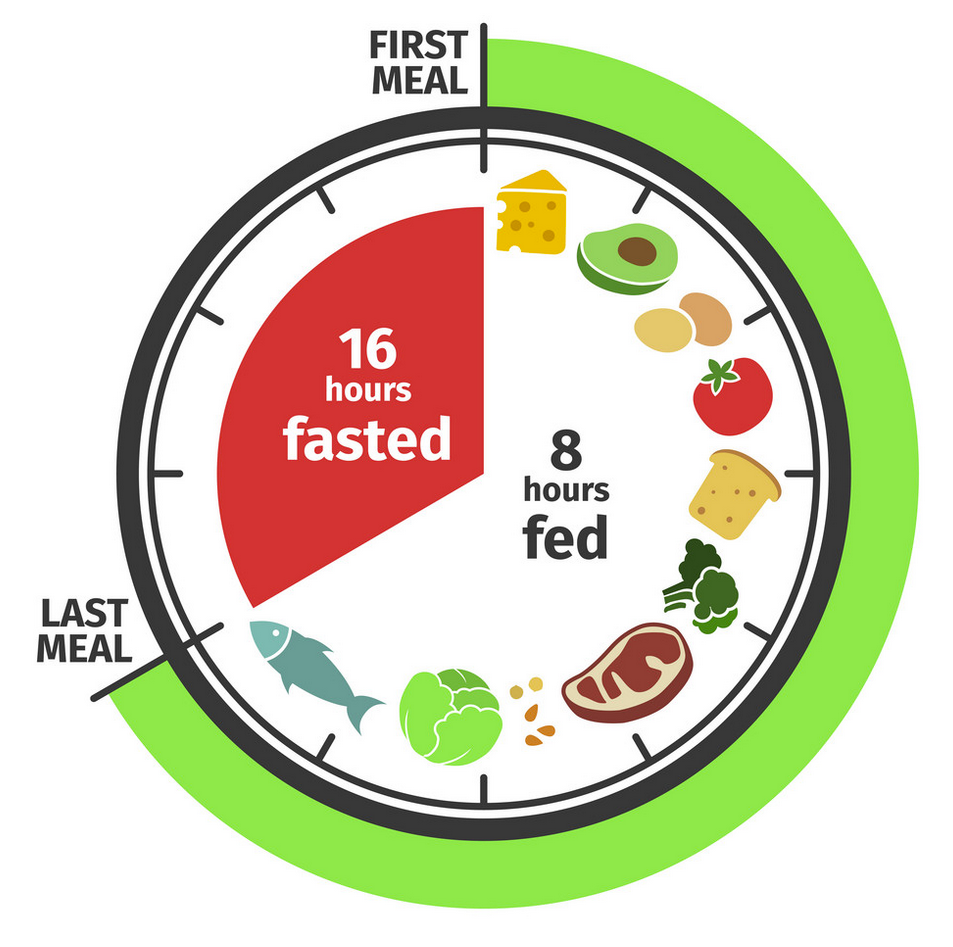Overview
Intermittent fasting (IF) is used by the many to improve their health, simplify their lifestyles, and of course, to lose weight. It is currently one of the many popular health and fitness trends in the world.

Intermittent fasting can have powerful effects on your brain and body, and it can even help you live longer!
What is intermittent fasting?
Intermittent fasting (IF) is a general term for various meal timing schedules that cycle between periods of fasting and eating. It does not specify which food to eat but rather when you should eat them. Generally, it can be described as an eating pattern.
Common intermittent fasting methods involve 16 hours of fasting every day or a 24-hour fast, two times per week.
People in the ancient times did not have refrigerators, supermarkets, or food available year-round, and worst, they could not find anything to eat sometimes. Thus, throughout human evolution, fasting has already been a practice.
In fact, it is more natural to fast from time to time than always eating 3–4 (or more) meals every day.
Moreover, fasting is also often conducted for religious reasons, including in Christianity, Judaism, Islam, and Buddhism.
Different methods of intermittent fasting
There are various ways of conducting intermittent fasting, and all of which involve splitting the day or week into fasting and eating periods. During these periods, it’s either you eat very little or nothing at all.
Reducing calorie intake, the methods below should lead to weight loss so long as you don’t eat too much during the eating periods.
The 16/8 method
The 16/8 is the most popular method of fasting, which involves skipping breakfast and restricting your daily eating period to 8 hours. Then you have a 16-hour fast in between. It is also known as the Leangains protocol.
Most people having an intermittent fasting find this method to be the most sustainable, simplest, and easiest to stick to.
Eat-stop-eat method
The eat-stop-eat method involves a 24-hour fast once or twice a week, for example, not eating from dinner on day 1 until dinner the next day.
The 5:2 diet method
In the 5:2 diet method, you only consume 500–600 calories for two non-consecutive days of the week, but during the other 5 days, you eat normally.
Intermittent fasting affects your cells and hormones
When you do intermittent fasting, a lot of things happen in your body on the molecular and cellular levels. That is, the body adjusts the hormone levels so the stored body fat becomes more accessible. The cells also initiate important repair processes and change the expression of genes.
The following changes are responsible for the health benefits of intermittent fasting:
Human growth hormone (HGH)
The growth hormone levels go up as much as 5-fold, and it has benefits for muscle gain and fat loss.
Insulin
Insulin sensitivity improves and the insulin levels dramatically drop; the stored body fat becomes more accessible with lower insulin levels.
Cellular repair
The cells initiate cellular repair process upon fasting; it includes autophagy wherein the cells remove and digest old, dysfunctional proteins that build up inside the cells.
Gene expression
There are also changes in the functions of the genes related to longevity and protection against disease.
Intermittent fasting for weight loss
Most of the time, people do intermittent fasting to achieve weight loss—it’s the most common reason. Eating fewer meals during intermittent fasting leads to an automatic reduction in calorie intake.
Moreover, intermittent fasting changes the levels of the hormone to facilitate weight loss and increases the release of the fat burning hormone noradrenaline.
Several studies have shown that intermittent fasting can be a very effective weight loss tool.
A review study in 2014 found that fasting can cause 3–8% weight loss in just 3–24 weeks, which is a very significant amount, compared with most weight loss studies. Accordingly, people also lost their waist circumference for about 4–7%, which indicates a significant loss of harmful belly fat building up around the organs causing disease.
Another study suggests that intermittent fasting can cause less muscle loss compared with the standard method of continuous calorie restriction. However, if you compensate by eating a massive amount during eating periods, you’ll not likely lose weight at all.
Intermittent fasting helps you eat fewer and burn more calories; it is the main reason for weight loss success. Additionally, fasting is an effective way to lose weight and belly fat as it also slightly boosts your metabolism while helping you eat fewer calories.
Intermittent fasting benefits
There were several studies conducted on intermittent fasting for both humans and animals. These studies have shown that intermittent fasting helps you live longer as it can have powerful benefits for weight control, as well as the health of your brain and body.
The following are the health benefits of intermittent fasting:
Weight loss
As mentioned earlier, intermittent fasting is a very effective tool to lose weight and belly fat as it helps you lessen your calorie intake and it also boosts your body’s metabolism.
Insulin resistance
Intermittent fasting reduces insulin resistance which lowers the blood sugar and fasting insulin levels. It protects you from type 2 diabetes.
Inflammation
There are studies that show reductions in markers of inflammation—a key driver of many chronic diseases.
Heart health
Intermittent fasting may reduce all risk factors for heart disease, such as blood triglycerides, “bad” LDL cholesterol, inflammatory markers, insulin resistance, and blood sugar.
Cancer
It has been shown by some animal studies that intermittent fasting may prevent cancer.
Brain health
Intermittent fasting has been known to increase the brain hormone BDNF and may aid the new nerve cell growth. Moreover, it protects you against Alzheimer’s disease.
Anti-aging
Studies showed that rats on intermittent fasting lived 36–83% longer, thereby extending the lifespan in rats.
But most studies were either small or conducted in animals. Higher quality human studies on the subject are yet to be conducted.
Simple healthy lifestyle with intermittent fasting
Intermittent fasting simplifies your lifestyle and improves your health—that is why it is very popular among the life-hacking crowd. It makes your life easier as you need not cook more often or clean up after as many meals as before.
Although it requires work to plan for and cook healthy meals, at least you don’t do it more often.
Who should avoid intermittent fasting?
Intermittent fasting is not for everyone. Those who have a history of eating disorders or those who are underweight are discouraged to fast without consulting with a health professional first. Also, pregnant women or those who are having issues with fertility must consider holding off on intermittent fasting as it can be downright harmful.
Furthermore, allowing the children to fast is probably not a good idea.

Intermittent fast for women
Some people say that intermittent fasting is not beneficial for women as it is for men. That is, one study demonstrated that it worsened blood sugar control in women while improving insulin sensitivity in men.
Although human studies relative to this subject is not yet available, studies in rats showed that intermittent fasting makes female rats infertile, masculinized, emaciated, and causes them to miss cycles.
There were a number of testimonials from women whose menstrual period stopped upon doing intermittent fasting and returned to normal as they resumed their previous eating pattern.
Thus, women should be careful with fasting, and therefore follow separate guidelines such as immediately stopping intermittent fasting if they encounter problems like amenorrhea.
Intermittent fasting side effects
The intermittent fasting main side effect is hunger. With hunger comes feeling weak and the brain may not function well as it used to. But that is only temporary as your body can adapt to the new meal schedule gradually.
Those with underlying medical conditions should consult a health professional first before fasting.
Basically, intermittent fasting is safe—there’s no danger in not eating for a while if you are physically fit and well-nourished overall.
Frequently asked questions
Is drinking liquids during intermittent fasting fine?
During fasting, drinking liquids such as water, tea, coffee, and other non-caloric beverages is fine. Just do not put sugar in your coffee. As coffee can blunt hunger, it can be beneficial during a fast.
Is skipping breakfast for intermittent fasting healthy?
There’s no problem with skipping breakfast for intermittent fasting so long as you eat healthy foods for the rest of the day.
Is taking supplements during intermittent fasting not dangerous?
Taking supplements during intermittent fasting is fine, but it is noteworthy that some of them such as fat-soluble vitamins work better when taken with meals.
Fasting affects the metabolism
Studies proved that short-term fasting can boost metabolism but longer fasts can suppress metabolism.
Starting intermittent fasting
It’s not impossible that you’ve done many intermittent fasts in your life unknowingly.
That is, if you’ve eaten dinner and woke up late and wasn’t able to eat lunch the next day, then you have had a 16-hour fast. Some people don’t feel hungry in the morning so they instinctively eat this way.
The most sustainable and simplest method of intermittent fasting is the 16/8. Many people consider using this one as they try to practice intermittent fasting. As a beginner, you can start off with the 16/8 method.
If you’re getting used to it and feeling good during the fast, you can move on to more advanced fasts like fasting for 24 hours, once or twice a week (known as the eat-stop-eat method) or eating only 500–600 calories once or twice every week (known as the 5:2 diet method)
Another approach to intermittent fasting is simply skipping meals from time to time whenever it’s convenient for you—when you don’t have time to cook or you’re not hungry at all. It’s not really necessary to follow a structured intermittent fasting plan to achieve some of its benefits.
Conclusion
Many people tried intermittent fasting to improve their health, simplify their lifestyles, and of course, to lose weight.
If you are new to intermittent fasting, it is recommended to start with the simplest and most sustainable method—the 16/8 method—then perhaps later move on to more advanced fasts. It is better to experiment and choose a method that works for you.
Intermittent fasting can offer many benefits for your brain and body. It is also an effective tool for weight loss and may even reduce your risk of common ailments such as heart disease, type 2 diabetes, and cancer. Thus, it indeed helps you live longer. One of its major benefits is that it makes healthy eating simpler.
But people with underlying health conditions, underweight, children, and pregnant/lactating women are discouraged to have an intermittent fasting without consulting with a health professional.
Intermittent fasting is not something that is required for everyone. It is just one of the many lifestyle strategies in improving one’s own health. Exercising regularly, eating real healthy foods, and having enough sleep are still the most important factors towards a healthy body and mind.

READY TO GIVE INTERMITTENT FASTING A TRY? WAIT!
You are not being told about many of the most important fasting breakthroughs being discovered by leading doctors and medical research centers.
There’s no big conspiracy.
It’s just that these breakthroughs usually don’t get much publicity.
That’s because they’re reported in medical journals intended for doctors such as The New England Journal of Medicine… The Journal of the American Medical Association… Lancet… The American Heart Journal… among many others.
Or, in some cases, these discoveries are made in prestigious health centers in other parts of the world, and receive little or no coverage in the US media.
In still other cases, highly respected medical doctors uncover these breakthroughs in clinical studies in their own private practices. They report their findings to professional medical societies, but these discoveries often escape the notice of the mass media.
All of this leaves gaping holes in the health information you should be getting. Yet these “under-reported” discoveries can be of tremendous importance to you and those you love.
That’s why we created My Health G.O.A.T. (Greatest Of All Time).Until My Health G.O.A.T. came along, if you wanted to try to keep on top of new intermittent fasting developments and scientific breakthroughs, you would have to subscribe to a shopping cart full of professional medical journals and newsletters.
And you’d have to spend a king’s ransom for the privilege!
You might also have to get a medical degree to understand many of the articles. But now that’s changed, thanks to My Health G.O.A.T.
Here are our top 11 articles you can read right now that will help give you a shortcut to success during your health and wellness journey as you learn more about intermittent fasting:












